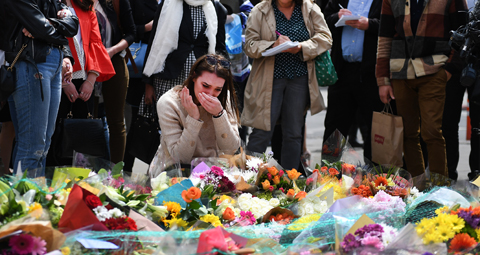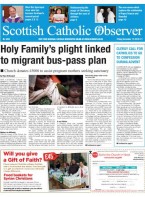June 23 | ![]() 0 COMMENTS
0 COMMENTS ![]() print
print

Love in our hearts trumps others’ hate
When we live in fear of checking the news, Faith helps us deal with the stuff of nightmares. By Sally Fraser
AS a parish secretary, I write the prayers for the weekend on Thursday afternoons or Friday mornings. Some of them I find online, some of them I make up myself. And there are ‘The Bits We Always Say’ to be written up too. I could type ‘Eternal rest grant unto them O Lord’ with my eyes closed now, or ‘we unite our prayers with Mary.’ Somewhat passive-aggressively, I now add PAUSE in bold after the call for a moment’s silent reflection, as if the week’s irritability manages to find an outlet in a place as holy as the prayers of the faithful.
And as they go to print before I leave the parish office there is always a moment of anxiety, that someone on the sick list might be recently deceased by Saturday evening vigil.
Or I will have made a mistake, read the wrong column in my spreadsheet, and someone will be read out as faithfully departed who is still very much alive and kicking, and I will be somehow willing them away, bumping them off, or some other such silly, half-formed worry. As if that’s how life works, or that’s how God works for that matter.
I take these papers to the sacristy and as I slide them into the appropriate folders, I breathe in the silence and the air filled with incense and a lingering damp problem and know that work is done for the week.
Sometimes after particularly challenging weeks, I fight the urge to quietly victory lap around the candlesticks or high-five an elderly altar server or two. And then, especially lately, there is one more anxiety. What if something terrible happens between now and Sunday?
Because we are all living in fear of checking the news at the moment, the stuff of nightmares infringing on real life. How do we respond to this fear, as a people told, more times than we are told anything else, not to be afraid?
What does that really look like in our lives? As a nation, there is growing understanding that terrorism’s only end is fear, so being unafraid is productive in itself.
And I can’t help thinking we, as people of Faith, have something to offer in creating a climate of fearlessness, something beyond our prayers. Especially this type of fear, this type of pain. After all, from the playground bully to the wife-beater to the gunman or the man wielding the knife, all acts of violence come from the same place.
The urge of one person to pass on their unbearable sense of powerlessness, to give it to someone else to hold.
It is here that our Faith is a particular gift to us, because at the centre of it is powerlessness and abandonment, someone at whose feet we can lay those feelings, always.
Outstretched arms that give us the strength to face the painful bits. We can sit with that powerlessness, hold it, and not let it consume us.
We can recognise the ways we are not powerless. Because I suspect that the repeated call to not be afraid is the call not to be paralysed by fear, and not to descend into despair, which is always hopeless, inert, uncreative and it can so easily be selfish. Terrorism creates this despair because it is indiscriminate, it cares not for our relative privilege, its brutality striking amidst our happiness and comfort. And I worry that this blinds us to those deaths and sufferings which are less scary because, let’s face it, they don’t threaten us so directly.
We are blind to those starving due to our greed, those homeless due to climate change, due to our lives of excess. The child who is trafficked, the woman who is sold, the man who is tortured in any of those parts of the world where distance, and frequency of horror, and otherness and unfamiliarity have somehow rendered suffering less heartbreaking to us.
These people fall further down our list of bidding prayers, if they make it in at all. Yet it is them we might actually be able to help in some practical way, those who need us fighting for them as well as our prayers.
It is every neighbour who needs us, whose suffering we might just be able to do something about.
This is the witness there has never been a clearer need to bear, in a world where all too often the presence of any religion at all is seen as contributing to a climate of atrocity.
All people of Faith are, to an extent, having to defend a God who allows these things to happen, and in whose name they are carried out. It is here that we need to be exacting, in our dealings with everyone, that nothing but love is radiated by our actions and words.
Because it’s love that is the opposite of fear of cause, and love made visible will, we have to believe, triumph in the end. But not just that visible love. After all, we don’t know how life works or how God works, but we suspect He doesn’t measure things the way that we do. He doesn’t deal in outcomes and statistics and tangible results.
He wants our hearts and souls as well as our actions and all we have to do is let Him be there. And so we kneel and try and offer that, even if we don’t know exactly how.
Because we are people of miracle and transformation, of mysterious process we don’t really get but try and believe in all the same. We are the water to wine, wine to blood, bread to body people.
That’s where the hope that trumps the powerlessness comes in, I suppose. That, in a PAUSE marked in capital letters by a passive-aggressive parish secretary, something unfathomable will happen whereby the love in our hearts will overcome the hate in others.
Sally Fraser is parish secretary at St Mary’s Star of the Sea in Leith, Edinburgh. She converted to Catholicism in her 20s and is married with two small children










